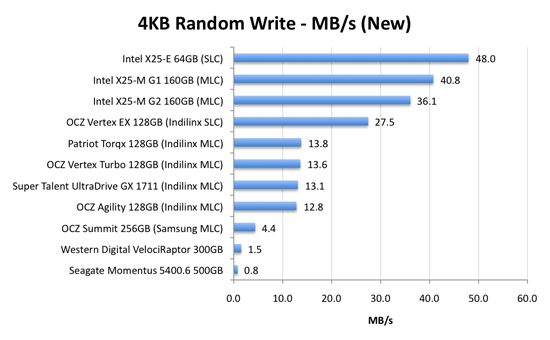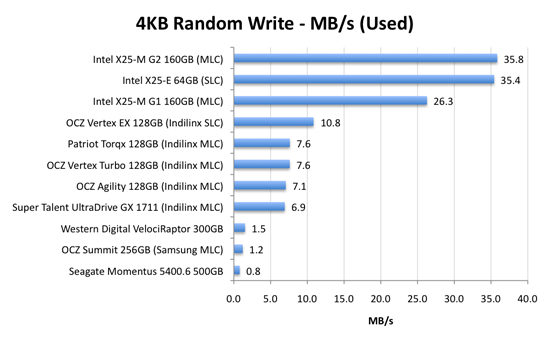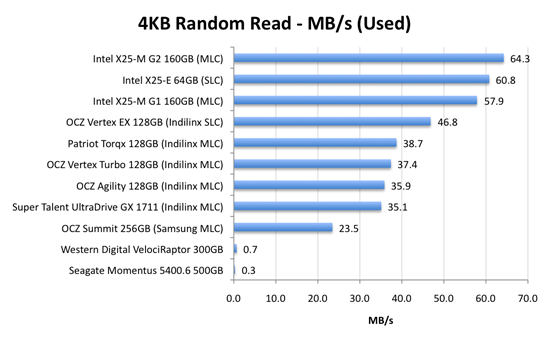The SSD Relapse: Understanding and Choosing the Best SSD
by Anand Lal Shimpi on August 30, 2009 12:00 AM EST- Posted in
- Storage
Random Read/Write Speed
This test writes 4KB in a completely random pattern over an 8GB space of the drive to simulate the sort of random writes that you'd see on an OS drive (even this is more stressful than a normal desktop user would see). I perform three concurrent IOs and run the test for 3 minutes. The results reported are in average MB/s over the entire time:

As we established in previous articles, the disk operations that feel the slowest are the random small file reads and writes. Both of which are easily handled by an SSD. A good friend of mine and former AnandTech Editor, Matthew Witheiler, asked me if he'd notice the performance improvement. I showed him the chart above.
He asked again if he'd notice. I said, emphatically, yes.

Now this is super interesting. Intel's X25-M G1 drops from 40.8MB/s when new down to 26.3MB/s in a well used state. Unfortunately for the G1, it will never get TRIM and will spend more time in the lower performance state over the life of the drive. But look at what happens with the X25-M G2: it drops from 36.1MB/s to 35.8MB/s - virtually no performance is lost. In fact, the G2 is so fast here that it outperforms the super expensive X25-E. Granted you don't get the lifespan of the X25-E and the SLC drive should perform better on more strenuous random write tests, but this is a major improvement.
The explanation? It actually boils down to the amount of memory on the drive. The X25-M G1 had 16MB of 166MHz SDRAM on-board, the G2 upped it to 32MB of slower 133MHz DRAM. Remember that Intel doesn't keep any user data in DRAM, it's only used for the remapping, defragmenting and tracking of all of the data being written to the drive. More DRAM means that the drive can now track more data, which means that even in the heaviest of random-write workloads you could toss at it on a normal desktop you will not actually lose any performance with the drive in a used state. And this is the drive Intel has decided to grant TRIM to.
The G2 is good.
The Indilinx drives do lose performance here. They drop from roughly 13MB/s down to 7MB/s. We're still talking ~5x the speed of a VelociRaptor, so there's no cause for alarm. But it's clear that even Indilinx's SLC drive can't match Intel's random write performance. And from what I hear, Intel's performance is only going to get better.
This is what the X25-M price premium gets you.

Bahahaha, look at the hard drive scores here: 0.7MB/s and 0.3MB/s? That's freakin' terrible! And that's why your system feels so slow when you start it up, there are a ton of concurrent random reads and writes happening all over the place which your hard drive crunches through at roughly 0.5MB/s. Even the Samsung based OCZ Summit manages a significant performance advantage here.
The Indilinx drives all cluster around the 30 - 40MB/s mark for random read performance, nothing to be ashamed of. The Intel drives kick it up a notch and give you roughly 60MB/s of random read performance. It's a noticeable improvement. As our application launch tests will show however, loading a single app on either an Indilinx or Intel drive will take about the same amount of time. It's only in the heavy multitasking and "seat of the pants" feel that you'll have a chance at feeling a difference.










295 Comments
View All Comments
Anand Lal Shimpi - Monday, August 31, 2009 - link
Intel insists it's not an artificial cap and I tend to believe the source that fed me that information.That being said, if it's not an artificial cap it's either:
1) Designed that way and can't be changed without a new controller
2) A bug and can be fixed with firmware
3) A bug and can't be fixed without a new controller
Or some combination of those items. We'll see :)
Take care,
Anand
Adul - Monday, August 31, 2009 - link
Another fine article anand :). Keep up the good work.CurseTheSky - Monday, August 31, 2009 - link
This is absolutely the best article I've read in a very long time - not just from Anandtech - from anywhere.I've been collecting information and comparing benchmarks / testimonials for over a month, trying to help myself decide between Intel, Indilinx, and Samsung-based drives. While it was easy to see that one of the three trails the pack, it was difficult to decide if the Intel G2 or Indilinx drives were the best bang for the buck.
This article made it all apparent: The Intel G2 drives have better random read / write performance, but worse sequential write performance. Regardless, both drives are perfectly acceptable for every day use, and the real world difference would be hardly noticeable. Now if only the Intel drives would come back in stock, close to MSRP.
Thank you for taking the time to write the article.
deputc26 - Monday, August 31, 2009 - link
been waiting months for this one.therealnickdanger - Monday, August 31, 2009 - link
Ditto! Thanks Anand! Now the big question... Intel G2 or Vertex Turbo? :) It's nice to have options!Hank Scorpion - Monday, August 31, 2009 - link
Anand,YOU ARE A LEGEND!!! go and get some good sleep, thanks for answering and allaying my fears... i appreciate all your hard work!!!!
256GB OCZ Vertex is on the top of my list as soon as a validated Windows 7 TRIM firmware that doesnt need any work by me is organized....
once a firmware is organised then my new machine is born.... MUHAHAHAHAHAHA
AbRASiON - Monday, August 31, 2009 - link
Vertex Turbo is a complete rip off, Anand clearly held back saying it from offending the guy at OCZ.Now the other OCZ models however, could be a different story.
MikeZZZZ - Monday, August 31, 2009 - link
I too love my Vertex. Running these things in RAID0 will blow your mind. I'm just waiting for some affordable enterprise-class drives for our servers.Mike
http://solidstatedrivehome.com">http://solidstatedrivehome.com
JPS - Monday, August 31, 2009 - link
I loved the first draft of the Anthology and this is a great follow-up. I have been running a Vertex in workstation and laptop for months know and continue to be amazed at the difference when I boot up a comparable system still running standard HDDs.gigahertz20 - Monday, August 31, 2009 - link
Another great article from Anand, now where can I get my Intel X-25M G2 :)